In this guide from the recycling experts at Great Western Recycling we explore how individuals and businesses recycle plastic, which plastics be recycled, and what actually happens when plastic is recycled.
How to Recycle Plastic
The method by which plastic is recycled by businesses and individuals may differ slightly, however the overall process is very similar.
Residential waste in the UK is collected via kerbside collections, funded and organised by local authorities. Individuals simply have to separate general waste from dry mixed recyclable waste and allocate the recycling waste to the correct box for collection. Around 45% of plastic waste created by households in the UK is recycled each year. Although the process is simple, a lack of instruction and clarity on what plastics can and can’t be recycled leads to plastic waste often ending up with general waste destined for landfill.
See more: What is Dry Mixed Recycling?
Commercial plastic recycling happens in much the same way; however, the responsibility lies with businesses to find their own registered waste carrier and appropriate waste storage bin equipment. Once a business has found a waste management provider, they can hire various waste bins and organise collections as needed accordingly to the type and volume of waste they produce.
According to the UK Government, businesses must:
- Keep waste to a minimum by doing everything you reasonably can to prevent, reuse, recycle or recover waste (in that order)
- Sort and store waste safely and securely
- Complete a waste transfer note for each load of waste that leaves your premises
- Check if your waste carrier is registered to dispose of waste
- Not allow the waste carrier to dispose of your waste illegally
In regard to plastic recycling, this means businesses must have the appropriate dedicated waste bins for plastic and other dry mixed recycling.
You can find out more about commercial waste management with Great Western Recycling’s’ guide to commercial waste collection & disposal.
Once collected from residences or businesses, all waste streams are taken to Waste Transfer Stations, where it is further sorted then transported on for further processing/recycling.
What Plastics Can Be Recycled?
There exists a wide array of plastic types, and not all can be easily recycled. Plastic waste deemed ‘recyclable’ is usually made up of the easiest types to collect, process and recycle – otherwise known as ‘widely recycled’.
The top three most widely recyclable plastics are:
- Polyethylene Terephthalate (PET -) used for everyday product packaging such as water bottles.
- High Density Polyethylene (HDPE) – commonly found in packaging for household items i.e. milk cartoons.
- Polypropylene (PP) – often used for food related packaging including ready-meal trays.
Plastics that require additional specialised processing and are therefore not deemed widely recyclable include:
- Polyvinyl Chloride (PVC) – found in piping.
- Low Density Polyethylene (LDPE) – used for food bags and more lightweight packaging.
- Polystyrene (PS) – products such as plastic knives and forks.
- Other plastics that are not recycled include cling film, crisps packets, blister packaging etc.
There are a range of plastic products and materials that are recyclable but are not widely accepted for collection due to the requirement of specialised processing. Other reasons for non-collection include practicality; for example, plastic bin bags can clog machines during the sorting process. As a result, many plastics that can be recycled (albeit with complications) are seen as non-recyclable and end up in landfill.
Why are Some Plastics Not Recyclable?
Aside from the reasons given above, some plastic types aren’t widely recycled due to their makeup. Thermostat plastics can’t be recycled as their polymers are irreversibly bonded and do not breakdown to allow for repurposing. Thermoplastics, on the other hand, can be melted and broken to create new plastics materials.
Resin codes can be used as indication for the recyclability of a plastic product too. The code, from 1 to 7, identifies which plastic type a product is. The general rule is: the lower the number on the code, the more likely it is to be widely recycled. For example, PET (code 1) and HDPE (code 2) are far more commonly recycled than PS (code 6).
Plastic waste that is not recycled goes to landfill, which has many negative effects on the environment and human health. Plastic bags, which can be reused but not recycled, are especially blamed for the negative impact of plastic waste in landfill as they take centuries to decompose and leech contaminants into the soil. Also, plastic waste can end up in the ocean if not recycled and wreak havoc on marine animals; plastic waste in the ocean is responsible for over 100 million marine animal deaths each year.
How is Plastic Recycled?
Following collection, plastic waste is taken to a Waste Transfer Station alongside other dry mixed recycling. Once there, the process is:
- Plastic is separated from the other dry mixed recycling materials (i.e. cardboard, glass, paper, cans).
- Plastic is sorted by resin type. By grouping resin types, plastics can be processed with the applicable method.
- Plastic is ground and melted, known as mechanical recycling.
- OR plastic is broken down into monomers, used to create new polymers, known as chemical recycling.
- Processed plastic is made into new materials, products and objects. Plastic is commonly recycled into packaging, bags, bottles, caps, construction materials and automotive parts.
Plastic Waste Recycling with Great Western Recycling
If you are business in the UK looking to improve your waste management solution or achieve zero waste to landfill through recycling, get in touch with Great Western Recycling. We offer various waste management services and equipment hire to help businesses achieve an effective waste solution. With dry mixed recycling expertise and a range of bins for hire, Great Western Recycling are on hand for all your plastic recycling needs!
See more: Glass Recycling FAQ
